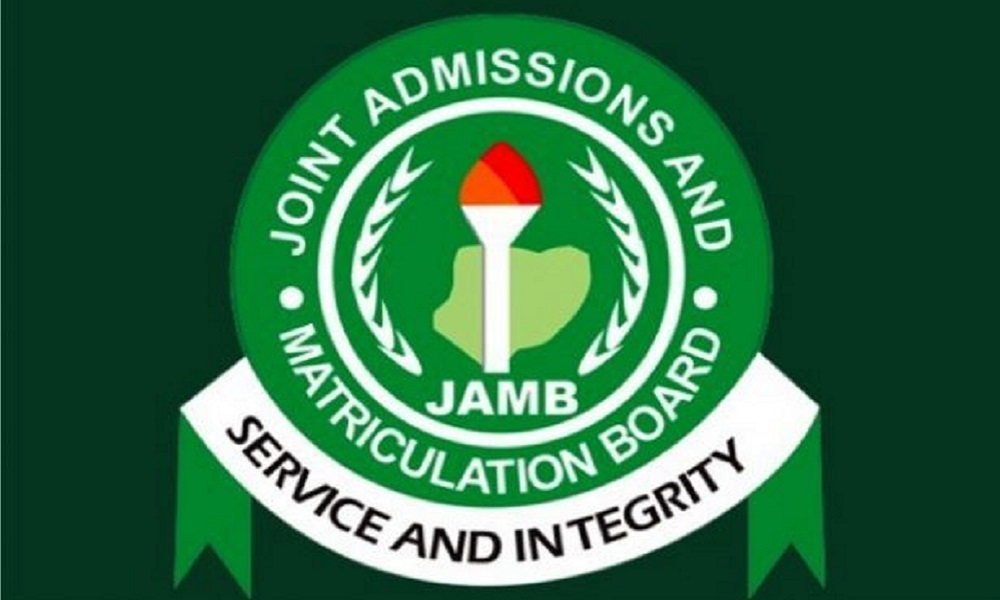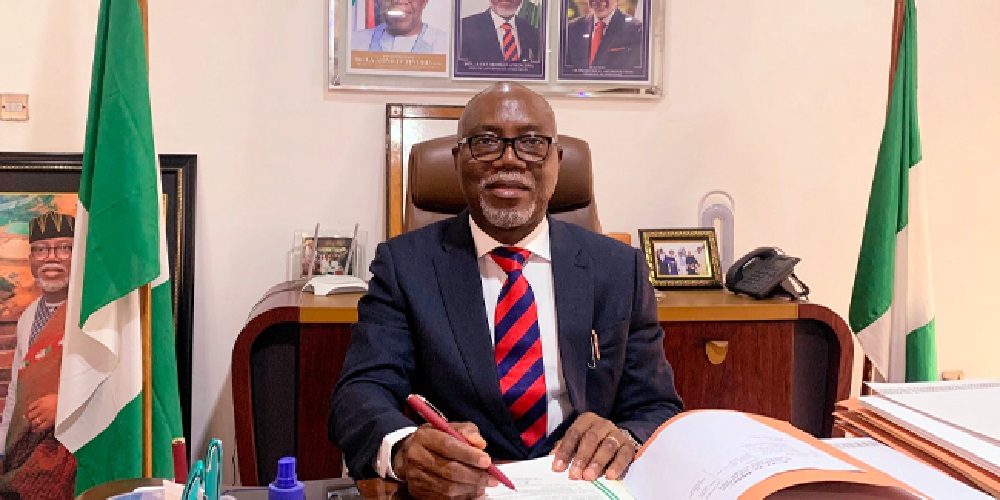News
Council of European Union’s Africa Working Group In Nigeria On A 4-day Visit

News
UTME 2025: JAMB registers 1.6m candidates in 26 days

The Joint Admissions and Matriculation Board, JAMB, announced on Monday that 1,687,860 candidates have already registered for the 2025 Unified Tertiary Matriculation Examination, UTME.
The board stated in its weekly bulletin that registration has been ongoing for 26 days, beginning on 3rd February 2025, with just six days remaining before the deadline on 8th March.
The 2025 UTME is scheduled to take place from Friday, 18th April 2025.
JAMB had earlier projected two million candidates for the examination.
Providing a breakdown of the ongoing registration, JAMB disclosed that in the first week alone, 201,867 candidates registered. In the second week, the number rose to 560,025, followed by 528,832 in the third week. By the fourth week, the total had increased to 1,290,715.
The board reiterated in its bulletin that there would be no extension of the registration period beyond 8th March 2025.
A review of the immediate past UTME in 2024 showed that 1,989,668 candidates registered for the exam. Of these, 1,904,189 sat the examination, while 80,810 were absent.
A total of 1,402,490 candidates—73.7 per cent of those who sat the exam—scored below 200, while just 0.4 per cent achieved scores above 300.
News
Ramadan: Kebbi, Bauchi, Kano counter CAN, say schools stay closed

The Kebbi, Bauchi and Kano State governments have reaffirmed that the holiday granted to both primary and secondary schools in their states for Ramadan fast will not be reconsidered, despite concerns raised by the Christian Association of Nigeria.
Speaking with The PUNCH on Monday, the Chief Press Secretary to the Kebbi State governor, Ahmed Idris, stated that the decision was made after consulting all relevant stakeholders, including religious leaders and parents.
“We are not reversing the decision. The closure of the schools was a result of meetings with all relevant stakeholders, including religious leaders, parents, and others. The leadership of CAN and the Muslim community were carried along before the decision was reached,” Idris said.
He further explained that the closure would only affect a maximum of two weeks from the initial academic calendar, emphasising that it would not disrupt school activities.
“Our normal school calendar already factored in closures during the fasting period. So, the issue of disrupting the academic calendar does not arise,” he added.
Similarly, the Kano State Director of Public Enlightenment in the state’s Ministry of Education, Balarabe Kiru, said there is no reason why the state government would reverse the directive as the decision to close the schools was taken after a meeting with all relevant stakeholders.
“There was a stakeholders’ meeting at the federal level during which the Christian Association of Nigeria was fully represented.
“More so, members of the State Executive Council have also agreed on the academic calendar. So there is no way we can reverse the directive. There is no going back on the decision so far taken with the knowledge and agreement of all stakeholders and the State Executive Council,” Kiru said.
Also speaking with The PUNCH on Monday, the Bauchi State Commissioner for Education, Lawal Zayam, said the decision to close schools would not be reviewed.
According to him, the holiday was captured in the 2024/2025 academic calendar of the state long at the beginning of the session.
Zayam said, “We have not done anything extraordinary. Before we drafted the 2024/2025 session calendar, the stakeholders’ input was considered.
“The stakeholders were the ones who propel this solution, especially the private school owners whose state chairman is a Christian.
“This has nothing to do with our academic calendar because, after the resumption, the students will have two weeks of studies to complete their second term before moving on to the third term.”
Stressing that all relevant stakeholders were carried along, the commissioner added, “We equally consulted other states, which we have exchanged programmes with before a memo was raised for the calendar and got approved by the governor.”
However, CAN in the 19 northern states and Abuja, on Monday, condemned the school closures in Kebbi and other Shariah-practicing states, including Bauchi, Katsina, and Kano, where schools have been shut for five weeks.
In a statement issued in Kaduna, Northern CAN Chairman, Rev. John Joseph Hayab, expressed concern that the closures would negatively impact students preparing for crucial examinations, including the Unified Tertiary Matriculation Examination and Junior Secondary School exams.
“We are worried about these closures, especially considering the setbacks already faced by students in most northern states due to rising insecurity. The decision could further hinder educational progress,” Hayab said.
He also noted that many of the children affected by the closures are under 14 years old and may not yet be religiously mature enough to observe fasting.
“Additionally, the recent Multidimensional Poverty Index by the National Bureau of Statistics highlights the educational challenges in these states, with Bauchi at 54%, Kebbi at 45%, Katsina at 38%, and Kano at 35% of children lacking access to education,” he added.
Hayab pointed out that even in predominantly Islamic countries such as Saudi Arabia and the United Arab Emirates, schools remain open during Ramadan, urging northern governors to adopt a similar approach.
“Instead of shutting down schools, a better approach would be to reduce school hours, allowing students and teachers time to observe fasting without compromising education. We have consulted Islamic scholars, and they confirmed that these school closures are more about political expediency than religious necessity,” he argued.
Consequently, CAN called on northern governors to reconsider their stance and prioritise education.
“CAN Northern Nigeria, therefore, wishes to appeal to governors of northern Nigeria, especially those who are championing this kind of ill-advised idea, to stop presenting our region in a bad light and make people laugh at us as if we are unserious people.
“As a peace-loving organisation, CAN call on the people to remain calm and law-abiding and challenge stakeholders and well-meaning Nigerians to address the matter amicably.
“As peace-loving people, CAN in the 19 northern states and Abuja in solidarity with the statement released by the National President of CAN yesterday on this subject matter are calling on the people to remain calm and law-abiding and challenge stakeholders and well-meaning Nigerians to address the matter most amicably,” Hayab added.
Meanwhile, Yobe State has opted against school closures for Ramadan.
Although the state’s Ministry for Basic and Secondary Education has yet to make an official statement, a visit to Bukar Ali El-Kanemi Primary School in Damaturu revealed that classes were ongoing on Monday.
The proprietor of Sarki Musa Memorial Academy, Prof. Musa Tukur, confirmed that school hours had been adjusted to close at noon instead of 1:30 pm to accommodate fasting students, while Quranic classes were temporarily suspended.
Also, Kebbi State Governor, Nasir Idris, on Monday, approved the reduction of official working hours for the state civil servants in view of the Ramadan fasting.
The state’s Commissione for, Ministry for Establishment, Pension and Training, Awwal Manu Dogondaji, announced this in a statement on Monday.
The commissioner said: “The newly approved hours for the state civil servants from Monday to Thursday is now from 8a.m. to 1p.m while Friday is from 8a.m. to 12p.m.”
He added that the normal working hours would resume at the end of Ramadan period.
Manu Dogondaji urged people to remain steadfast in prayer for prevailing peace and stability in the state and Nigeria at large.
Credit: PUNCH
News
Aiyedatiwa approves recruitment of 1,000 teachers

Ondo State Governor, Mr Lucky Aiyedatiwa, has approved the recruitment of 1,000 secondary school teachers in the state.
The governor is also putting the finishing touches to the employment of 1,000 teachers for primary schools in the state.
According to a statement issued by his Chief Press Secretary, Mr Ebenezer Adeniyan, on Monday, the governor’s approval came after the completion of the recruitment process by the Teaching Service Commission.
The PUNCH reports that the state TESCOM screened thousands of applicants last year for employment as teachers in the state.
The statement said successful candidates would begin their documentation immediately.
“The governor gave approval for the recruitment of 1,010 secondary school and 1,000 primary school teachers last year, which signalled the start of the recruitment exercise by TESCOM and the State Universal Basic Education Board.
“While the final list for the secondary school candidates was approved by the governor on Friday, that of the primary school candidates is currently undergoing its finishing touches.
“Governor Aiyedatiwa has expressed concern over teaching staff shortages in public schools, particularly in rural communities.
“This necessitated his directive that the recruitment must be based on the peculiar needs of the understaffed schools across the state,” the statement read.
The PUNCH reports that as part of efforts to improve education in the state, the governor, on Friday, February 28, 2025, approved the payment of N633m for the registration of students for the Senior Secondary School Certificate Examination of the West African Examination Council.
The governor also approved the upgrade and conversion of the Rufus Giwa Polytechnic, Owo, to the University of Agriculture and Agribusiness, Owo.
-

 News21 hours ago
News21 hours agoBreaking: Obasa is now LSHA Speaker, Meranda deputy
-

 News20 hours ago
News20 hours agoBREAKING! TInubu fires NYSC DG, announces fresh appointment
-

 Politics22 hours ago
Politics22 hours agoUPDATED: Present 2025 Budget in the next 48hrs, Rivers Assembly tells embattled Fubara
-

 News16 hours ago
News16 hours ago“My wife has tasted over 21 men in the movie industry-Comedian Ijoba laments
-

 Politics21 hours ago
Politics21 hours agoBREAKING: Ex- Lagos guber candidate Jandor dumps PDP
-

 News16 hours ago
News16 hours agoKano Hisbah nabs Muslims for eating in public during Ramadan
-

 News20 hours ago
News20 hours agoPalmpay Customer Panic – Before Opay Puts Me In Trouble
-

 News19 hours ago
News19 hours agoECOWAS Parliament Kicks Off First Extraordinary Session







